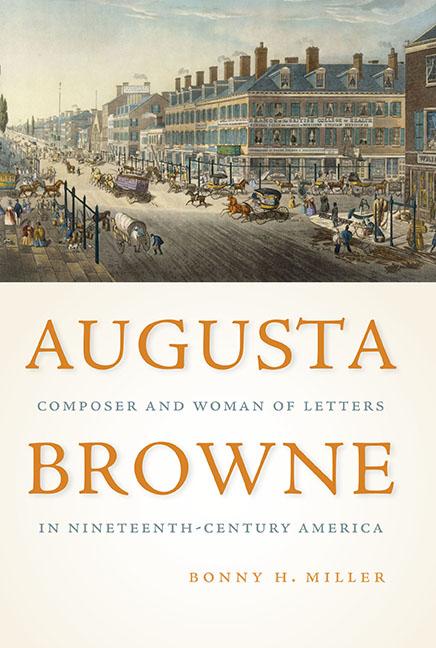Book contents
- Frontmatter
- Contents
- List of Illustrations
- Preface
- Acknowledgments
- Introduction
- 1 First Steps
- 2 Apprentice in a Family Music Business
- 3 Philadelphia Debut
- 4 A Young Professor of Music
- 5 A New Leaf
- 6 Her Own Woman
- 7 Courtship and Consequences
- 8 Pilgrim in Progress
- 9 “Glad Fruition”
- 10 Legacy in Music
- 11 Legacy in Literature
- 12 Contributions to Music Journalism
- 13 A Legacy Written into History
- Appendixes
- Appendixe 1 Children and Descendants of David Samuel Browne and Elizabeth Montgomery Browne
- Appendixe 2 Chronology of Augusta Browne’s Music and Letters
- Appendixe 3 List of Musical Works
- Appendix 4 Selected Glossary
- List of Abbreviations
- Notes
- Selected Bibliography
- Index
12 - Contributions to Music Journalism
Published online by Cambridge University Press: 23 October 2020
- Frontmatter
- Contents
- List of Illustrations
- Preface
- Acknowledgments
- Introduction
- 1 First Steps
- 2 Apprentice in a Family Music Business
- 3 Philadelphia Debut
- 4 A Young Professor of Music
- 5 A New Leaf
- 6 Her Own Woman
- 7 Courtship and Consequences
- 8 Pilgrim in Progress
- 9 “Glad Fruition”
- 10 Legacy in Music
- 11 Legacy in Literature
- 12 Contributions to Music Journalism
- 13 A Legacy Written into History
- Appendixes
- Appendixe 1 Children and Descendants of David Samuel Browne and Elizabeth Montgomery Browne
- Appendixe 2 Chronology of Augusta Browne’s Music and Letters
- Appendixe 3 List of Musical Works
- Appendix 4 Selected Glossary
- List of Abbreviations
- Notes
- Selected Bibliography
- Index
Summary
When Augusta Browne published her first essays on music in 1845, there were no comparable Englishwomen writing music journalism. Augusta's only model may have been Margaret Fuller, the pathbreaking New England intellectual who published concert reviews as early as 1841 in the transcendentalist periodical the Dial. Beginning in 1844 Fuller reported on music events and the general arts in her columns for the New York Tribune. Horace Greeley started his daily Tribune on April 10, 1841, just a few weeks before the Browne family relocated to New York City from Philadelphia. When Fuller went to Europe in 1846 as a foreign correspondent for the Tribune, she wrote about the operas that she attended. Unlike Fuller's discussion of concert performances, Augusta immediately established the style of topical arts piece that would characterize her music journalism with a meandering collection of “Musical Thoughts,” soon followed by “The Music of America” and “The Divine Origin of Music.”
Although Fuller found that symphonic music—especially that of Beethoven (whom she called “hero,” “Liberator,” and “democratic king”)— best embodied her conception of harmony as a model for society, she had the greatest praise, like Augusta, for Handel's Messiah as an embodiment of Christian faith. Fuller upheld the power of music to uplift the spirits and to erase physical pain or psychological suffering; and by extension she thought that it could heal the suffering and social divisions of Americans. Thus Fuller's belief in music as “a tool of social reform,” and “a moral force that could harmonize social and economic rifts” went far beyond Augusta's ideals of music for spiritual uplift. The transcendentalist writer conceived of symphonic harmony as a model for national harmony. She envisioned that, just as in an orchestral symphony in which disparate sounds and instruments coalesce into a harmonic whole, a community could come together as one.
A decade later—Fuller having died in the shipwreck of the Elizabeth near Fire Island in 1850—Augusta was the only essayist on music cited in a list of two hundred “American Female Writers” in the Lady's Almanac for 1854.
- Type
- Chapter
- Information
- Augusta BrowneComposer and Woman of Letters in Nineteenth-Century America, pp. 279 - 298Publisher: Boydell & BrewerPrint publication year: 2020



